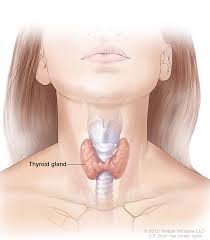10 Silent Signs Your Thyroid May Be in Trouble
Introduction
The thyroid gland, a small butterfly-shaped organ located at the base of your neck, may be modest in size, but its impact on your overall health is enormous. This vital endocrine gland acts as your body’s metabolic control center, producing hormones that regulate energy production, weight management, heart rate, body temperature, and countless other physiological processes. Despite its crucial role, millions of people worldwide live with thyroid problems for years, sometimes even decades, because the symptoms often develop gradually and can be easily mistaken for signs of stress, aging, or other common health issues. Thyroid problems are far more common than most people realize, affecting up to 20 million Americans alone.
The thyroid produces two primary hormones: thyroxine (T4) and triiodothyronine (T3), which work together to control how quickly your body uses energy, makes proteins, and responds to other hormones. When this delicate system falls out of balance, it can create a cascade of symptoms that affect virtually every aspect of your physical and mental well-being. The two main thyroid problems are hypothyroidism, where the gland produces too little hormone, and hyperthyroidism, where it produces too much. Both types of thyroid problems can significantly impact your quality of life if left untreated.
Recognizing these early warning signs is crucial because thyroid problems are highly treatable when caught early. Early intervention can prevent complications and help restore your energy, mood, and overall health. Understanding what to watch for empowers you to advocate for your health and seek appropriate medical evaluation when needed.
10 Silent Signs Your Thyroid Needs Attention ⚠️
1. Unexplained Fatigue and Energy Depletion Persistent exhaustion that doesn’t improve with adequate rest is one of the most common early indicators of thyroid dysfunction. This isn’t the normal tiredness you feel after a busy day, but rather a profound, bone-deep fatigue that makes even simple tasks feel overwhelming. People with hypothyroidism often describe feeling like they’re moving through molasses, while those with hyperthyroidism may feel wired but still exhausted.
2. Unexplained Weight Changes Your thyroid directly controls your metabolic rate, so disruptions can cause significant weight fluctuations without changes to diet or exercise habits. Hypothyroidism commonly causes gradual weight gain, often accompanied by difficulty losing weight despite efforts. Conversely, hyperthyroidism may lead to unexpected weight loss, even when appetite increases.
3. Hair Loss and Brittle Nails Thyroid hormones are essential for healthy hair and nail growth. When levels are imbalanced, you may notice hair becoming thin, dry, or falling out more than usual. Your nails might become brittle, weak, or develop ridges. These changes often affect the outer third of eyebrows as well, which is a particularly telling sign of thyroid dysfunction.
4. Persistent Dry Skin Hypothyroidism frequently causes skin to become dry, rough, and sometimes pale or yellowish. This occurs because reduced thyroid hormone levels slow down cell turnover and decrease oil production. The skin may also feel unusually cold to the touch and may not respond well to typical moisturizing treatments.
5. Mood Changes and Mental Health Symptoms Thyroid problems can significantly affect your emotional well-being and mental clarity. Hypothyroidism often contributes to depression, irritability, and mood swings, while hyperthyroidism may cause anxiety, nervousness, restlessness, and difficulty managing stress. These mood changes can be subtle at first but tend to worsen over time if the underlying thyroid problems remain untreated.
6. Slow Heart Rate (Bradycardia) An underactive thyroid can cause your heart rate to drop below normal, typically under 60 beats per minute when at rest. This may leave you feeling sluggish and can contribute to feelings of weakness or dizziness, especially when standing up quickly or during physical activity.
7. Rapid Heart Rate (Tachycardia) Conversely, an overactive thyroid can cause your heart to race, even during rest or sleep. You might notice palpitations, irregular heartbeats, or a pounding sensation in your chest. This can be particularly noticeable when lying down or during times that should be relaxing.
8. Difficulty Concentrating and Memory Problems Thyroid problems can create significant cognitive challenges, often described as “brain fog.” You might experience trouble focusing, difficulty making decisions, memory lapses, or feeling mentally sluggish. These symptoms can affect work performance and daily activities, often leading people to worry unnecessarily about more serious neurological conditions.
9. Swelling or Changes in the Neck Area Any visible enlargement, swelling, or unusual sensations in your neck area should be evaluated. This could indicate a goiter (enlarged thyroid), thyroid nodules, or inflammation. You might notice difficulty swallowing, a feeling of fullness in your throat, or changes in your voice.
10. Temperature Sensitivity Thyroid hormones help regulate body temperature, so imbalances often cause uncomfortable temperature sensitivities. Hypothyroidism typically makes you feel unusually cold, especially in your hands and feet, even in warm environments. Hyperthyroidism often causes excessive heat intolerance and increased sweating.
When to See a Doctor 👩⚕️
If you’re experiencing several of these symptoms, especially if they’ve persisted for weeks or months, it’s important to discuss them with your healthcare provider. Don’t wait for symptoms to become severe before seeking help. A simple thyroid blood test panel, including TSH (thyroid-stimulating hormone), T3, and T4 levels, can provide valuable insights into your thyroid function. Your doctor may also recommend additional tests such as thyroid antibodies or an ultrasound if initial results suggest thyroid dysfunction.
Conclusion
Your thyroid health is fundamental to your overall well-being, affecting everything from your energy levels and weight to your mood and cognitive function. These silent signs often develop so gradually that they become your new normal, but they don’t have to be. By staying alert to these warning signals and advocating for proper testing, you can take control of your health. Remember, thyroid problems are common, highly treatable conditions when properly diagnosed. Don’t ignore these silent signs — early detection and treatment can dramatically improve your quality of life and prevent long-term complications. Trust your instincts about your body and seek medical evaluation if something feels off.
Sources
American Association of Clinical Endocrinologists. (2024). “Thyroid Guidelines.” AACE Clinical Practice Guidelines. Retrieved from https://www.aace.com/disease-state-resources/thyroid/clinical-practice-guidelines-patients
American Thyroid Association. (2024). “Thyroid Function Tests.” Retrieved from https://www.thyroid.org/thyroid-function-tests/
Mayo Clinic. (2024). “Hypothyroidism (underactive thyroid).” Mayo Clinic Staff. Retrieved from https://www.mayoclinic.org/diseases-conditions/hypothyroidism/symptoms-causes/syc-20350284
Endocrine Society. (2024). “Thyroid and Parathyroid Hormones.” Hormone Health Network. Retrieved from https://www.hormone.org/diseases-and-conditions/thyroid
National Institute of Diabetes and Digestive and Kidney Diseases. (2024). “Thyroid Disease.” NIH Publication. Retrieved from https://www.niddk.nih.gov/health-information/endocrine-diseases/thyroid-disease
See more https://diabetes-endocrine.com/category/thyroid-health/



Leave a Reply